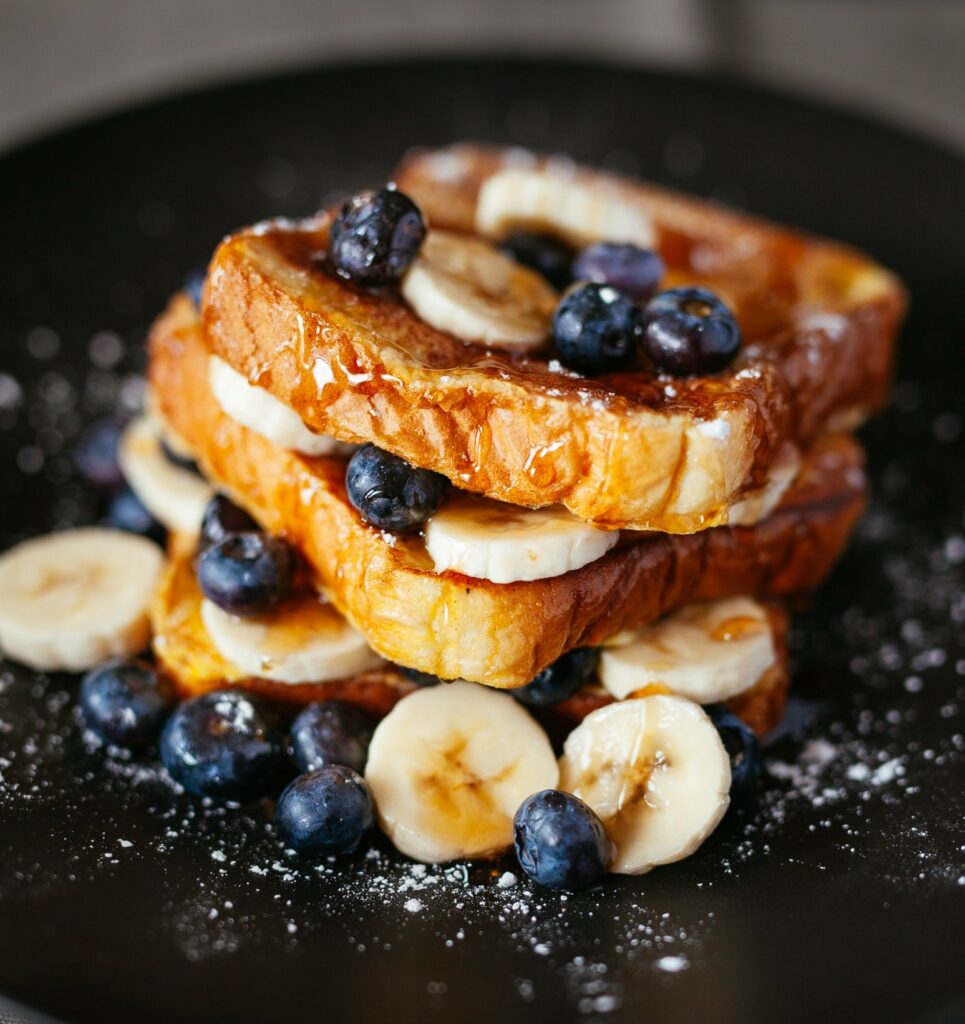As the best pro cyclists in the world tackle the Tour de France at the moment, a common question is how do they manage to be ready and recovered for every stage? Especially with all the climbing. And what has breakfast to do with it?
Caleb Ewan shares lots of great insights into these questions with his daily vlogs on Instagram. If you’re interested in the behind-the-scenes work of pros and pro teams I highly recommend checking out the vlogs. They’re quite entertaining and enjoyable. One thing that stands out in the vlogs is fuelling.
To be able to handle the daily grind of racing with the incredible energy expenditure a special focus on diet is crucial to perform on a high level again and again. One meal that should be paid special attention to is the rider’s breakfast. And this isn’t just important for pro riders. All cyclists that head out for a big ride with long distances like a 100 miler or a race should focus on breakfast.
The reason why it’s important to have a good meal before the race or ride is to top up glycogen stores. Carbohydrates are stored as glycogen in our muscles and the liver to supply energy during intense exercise.
However, getting it right is critical. Overeat or eat the wrong foods and you’ll find yourself suffering from stomach problems during the race. Eat too little and you might run out of energy and get dropped. This is where science can give us guidance on carbohydrate intake and other nutrients. And as a lot comes down to individual preferences, pro cyclists like Ewan can show us how science is applied in the real world.
Let’s look at the important factors that we must consider when breakfast is planned for race day.
Carbohydrates Are Key to Breakfast
Of all three macronutrients, carbs are the most important when it comes to breakfast as your body relies heavily on these for energy in a race. But glycogen stores are limited and after the night’s fast liver glycogen is significantly reduced. So it’s critical to fill up these stores to the limit to perform your best. Some carbs may even end up in the muscles, although carbo-loading should be done the days before the competition.
The common guidelines suggest 1-4 grams of carbs per kg of body weight in the 1-4 hours pre-race. That’s why Caleb Ewan was calculating and pondering with their nutritionist from Lotto Soudal about his breakfast targets. For him weighing 67.5 kg, this means to aim for 270 grams of carbs, as 67.5×4 is 270 g of carbs. And this is just breakfast.
However, this might not work for everyone and we have a large range here at least. One athlete might have the 4 grams of carbs, 2 hours before the start, while another can have just 2 grams of carbs 4 hours before the race. Of course, it makes sense to have a larger meal the more time you have before the start and a smaller meal if there’s less time available. Yet everyone works differently with the number of carbs and the timing and therefore recommendations should be adapted to your individual preferences.
Anyways if you cope with these high amounts how do you achieve it? A good approach is a combination of foods high in carbohydrates. As Ewan shows this can be banana pancakes, müsli, porridge, bread with jams, smoothies, or fruit juices.
To try and achieve the highest possible amount seems logical but what can you do if you struggle with your stomach just thinking about these high amounts of carbs? Let’s talk about that now.
Foods to Avoid or Limit at the Breakfast Table
The first step is to look at the evidence again. Two key factors increase the likelihood of gastrointestinal problems in a race or a heavy ride.
The first thing to pay attention to is fiber because fiber-rich foods take longer to digest. High-fiber meals can still be in your stomach at the start line. For example, try to avoid things like oats, whole-grain bread, and seeds. But if it works for you go for it.

The second thing is fat. Overeat on fat and it slows gastric emptying, so food doesn’t leave the stomach fast, and carbs again sit in your stomach and not in the muscles or the liver at the start line. High-fat foods to avoid include bacon, cheese, sausages, etc. Of course, the more time you have pre-race the less important it is. Caleb Ewan also enjoys some bacon and eggs pre-stage. But the less time you have the more important it gets.
It’s all about practicing a strategy that is enjoyable and purposeful. It’s about finding a balance.
Finding a Balance
As many ultra-endurance events start very early like Unbound Gravel, it’s important to find a balance between good sleep, great fuelling, and a comfortable gut.
If you have problems eating too close to your race then plan more time and wake up earlier. If you struggle with solid food pre-race go for a smoothie and juice, glycogen resynthesis is the same no matter if solid or liquid. If big portions are an issue go for smaller stretched-out meals. For example, I don’t like porridge and feel sluggish and hungry quickly after eating it, so I choose pancakes or bread for breakfast.
In addition, don’t neglect hydration in all the food heaven. Drink water immediately after waking up. Aim for 5-7 ml per kg of body weight. Then again 5-7 ml at breakfast. Check your Urine color, you’re looking for a light color. Add protein to your breakfast if you have enough time to digest make sure to get 20-30 grams of protein at breakfast to suppress protein breakdown and achieve your daily protein intake.
Ultimately, practice your nutrition and train your gut.
Eating Close but Not Close Enough to Start
A great idea from the guys of EF-Coaching is to eat as close as possible to your ride. I practice it successfully and it’s very efficient and makes high-quality sessions possible early in the morning. Eat some carbs pre-race or ride and make sure it’s close to the start and easy to digest within 5-10 minutes to go. Up to 15 minutes may still be possible.
Get this wrong and a state called hypoglycemia can occur at the beginning of the ride or race. This won’t hurt performance but feeling bonked from the start is always a bad idea. And from blood-glucose data from EF-Pro Cycling, it’s indicated that blood glucose is on the rise for 15 minutes post-eating. When you start early then make sure to eat not close but very close to the start of the ride.
Practice Makes Perfect
Nothing beats deliberate practice. As well as training consistently on the bike, familiarize your pre-race nutrition in terms of timing and amount. Find what works for you and eat to your preferences. The best days for practice are key sessions with a similar intensity as your goal race or smaller races. Therefore, you are acquainted with your breakfast of champions and eat with confidence before your big day.

Pre-Ride Breakfast Examples
Here are good breakfast examples you can mix and match to meet the recommendations of 1-4 grams of carbs per kg bw according to your individual preferences.
- Lotto Soudal’s Banana Pancakes – add berries, maple syrup, honey, and yogurt as desired
- Weetabix Cereal if you like them
- Milk Rice with Cinnamon
- Fruit Juices like orange, grapefruit, apple, multivitamins
- Overnight Oats
- The Gold Standard Porridge with Chia seeds, berries, maple syrup, Banana
- Bircher Musli with Banana and Apple
- Cereals like Cornflakes or Rice Crispies with Rice Milk
- Waffles with berries, maple syrup, honey, yogurt, etc.
- Toast, Bread, Bagels with toppings like jam, honey, peanut butter, nut kinds of butter
- Bacon and Eggs if time allows and you cope with it – provide you protein also
- Omelet – again a great option for proteins in the morning
Ready to Step Up Your Cycling Training?
If you enjoyed this and want to improve your cycling performance, then get your hands on one of my plans, available on TrainingPeaks, and ride faster for longer, or click below to get my specific base, build, and peak plans for amateur and elite cyclists:
- RV The Block Periodization Plan, 4 Weeks (6-8 Hours)
- RV Improve Your FTP, 8 Weeks on 6 Hours, 10 Hours, or 15 Hours
- RV Gravel Advanced Base Plan 8-12 Hours (12 Weeks) – All Gravel Races
Follow me on Instagram for more Cycling Content.
- Get my favorite Power Meter *here.
- Get my favorite Shoes *here.
- Get the Vittoria Corsa Tyres I use *here.
Footnotes
- Quantitation of Hepatic Glycogenolysis And Gluconeogenesis in Fasting Humans With 13C NMR
- Position of the Academy of Nutrition and Dietetics, Dietitians of Canada, and the American College of Sports Medicine: Nutrition and Athletic Performance
- Influence of liquid and solid meals on muscle glycogen resynthesis, plasma fuel hormone response, and maximal physical working capacity.
- Effects of fat on gastric emptying of and the glycemic, insulin, and incretin responses to a carbohydrate meal in type 2 diabetes
Ad Hint for Asterisk Links
*Asterisks are affiliate links from services and gear I use and love. If you take action (i.e. make a purchase) I’ll earn some coffee money which I promise to drink while you enjoy the content and offers. You don’t pay a higher price.
